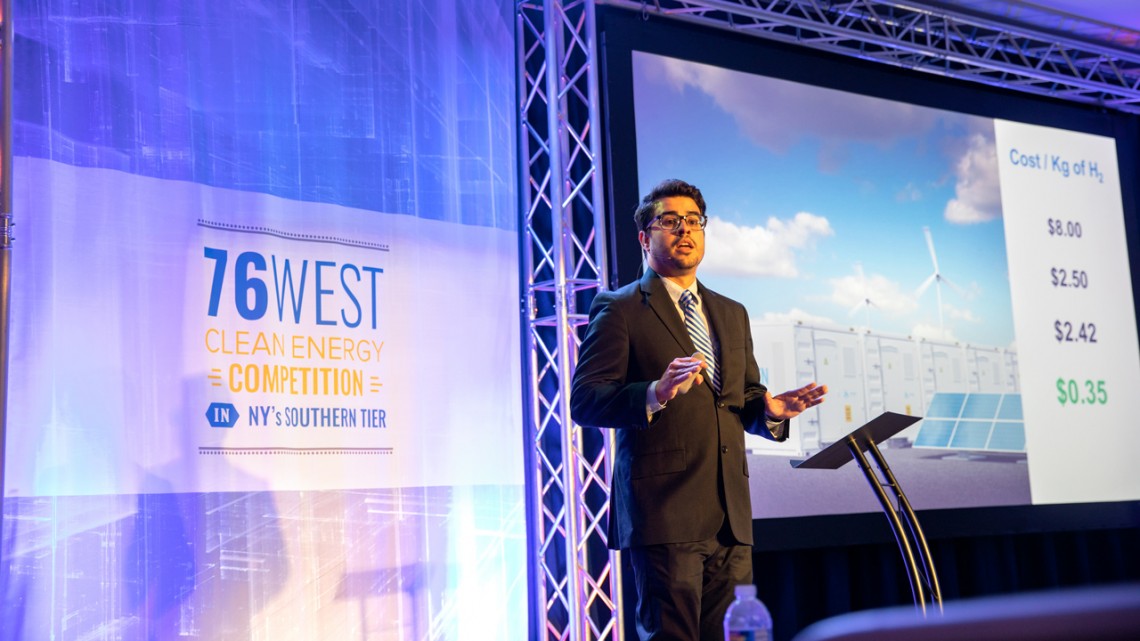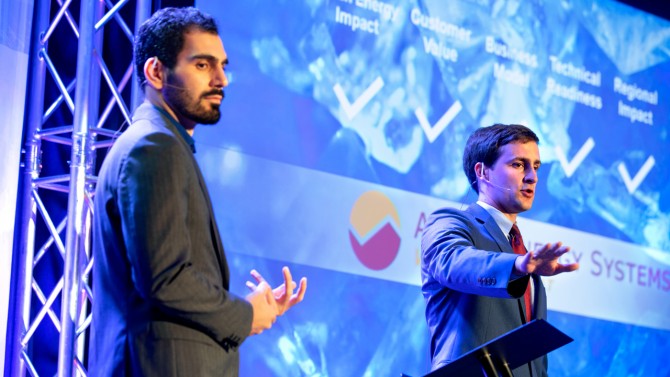
Gabriel G. Rodríguez-Calero, Ph.D. ’14, pitches Ecolectro, a startup he co-founded, at the 76West Clean Energy Competition.
Cornellians vie for $2.5M in clean-energy competition
By Susan Kelley
Four teams of Cornellians, armed with a Cornell education or licensed technology or both, were among 20 finalists showcasing bold, cutting-edge startups that have the potential to revolutionize the future of energy at the 76West Clean Energy Competition July 31-Aug. 1.
The standing room-only auditorium in Stocking Hall indicated the fervor of the competition, where teams from eight U.S. states, Canada and Ireland pitched their clean energy businesses to a panel of eight judges. Culled from over 150 applicants, the finalist teams each had just 10 minutes to pitch their businesses and how they would improve the clean energy and economic landscape in New York’s Southern Tier region, which lies at 76 degrees west longitude.
At stake: $2.5 million in prize money. The teams competed for one grand prize of $1 million, one $500,000 prize and four $250,000 awards. The six winning teams will be announced in late September in Binghamton, New York.
“New York state is truly a national leader in pushing and investing in clean energy initiatives,” said Brian Bauer, who manages 76West as program director for clean energy programs at the Cornell Center for Regional Economic Advancement. “Companies are always eager to learn more about the state’s initiatives and are eager to be a part of the state’s bold vision.”
Now in its third year, the competition was created by New York Gov. Andrew Cuomo to support innovative clean energy solutions and strengthen the economy in the Southern Tier by creating jobs, boosting manufacturing, and continuing research and development in the region. Winners must locate in or create jobs in the Southern Tier for at least two years.
“It’s all about strengthening the economy here in the Southern Tier and, at the same time, helping address the climate change challenge in the world and doing that all in a very constructive way,” Bauer said.
Two Cornell faculty members served as judges: Lindsay Anderson, associate professor of biological and environmental sciences, and Mark Milstein, clinical professor of management at the Samuel Curtis Johnson Graduate School of Management and director of Cornell’s Center for Sustainable Global Enterprise. Five of the 21 mentors who coached the finalists were either Cornell alumni or staff. The co-founders of four teams are Cornell alumni, and two teams – Ecolectro and Capro-X – have technology licensed from Cornell.
Ecolectro, co-founded by Gabriel G. Rodríguez-Calero, Ph.D. ’14, has a patented polymer technology that improves the economics of producing hydrogen, a renewable energy source that has three times the energy density of gasoline. The technology could lower the cost of hydrogen from $8 per kilogram to just 35 cents per kilogram. “At that point, hydrogen finally becomes the miracle energy source we all need,” said Rodríguez-Calero.
Juan Guzman, M.S. ’14, Ph.D. ’18, and his team at Capro-X turn dairy processing waste into valuable chemicals and biofuels. The technology is of special significance for New York state, which produces 80 percent of the U.S.’s Greek yogurt. Capro-X recently won seed grants from the National Science Foundation and NEXUS-NY. “Having the opportunity to compete in 76West really gave us an opportunity to hone our pitch and explain how much impact Capro-X can have for the sustainability and economic growth of New York state,” Guzman said.
The co-founders of Active Energy Systems, Mitchell Ishmael, M.S. ’15, Ph.D. ’17, and Levon Atoyan, M.S. ’16, Ph.D. ’18, pitched their electro-thermal energy storage system. Their prototype heat exchanger module, fabricated in the Southern Tier, freezes and melts ice 10 times more effectively than current ice energy storage technologies.
Empower Equity, co-founded by Herbert Dwyer, MBA ’19, and Derek LaClair, MBA ’14, makes energy-efficient upgrades to heating systems affordable for businesses and municipalities through a subscription service. The reduction in utility bills often covers the cost, so the subscription could pay for itself. A software component automates the project feasibility and, more importantly, credit underwriting.
Even if they don’t win prizes, each finalist team benefited from two months of coaching from a 76West mentor to prep for the competition. And all 20 finalists received a customized business development trip to the Southern Tier.
“We probably would not have connected with the business leaders in places like Chenango County and Incubator Works if it wasn’t for 76West,” Dwyer said. “Our experience and connections we made with 76West were priceless and completely worth the investment of time and resources to participate in the competition.”
Media Contact
Get Cornell news delivered right to your inbox.
Subscribe

